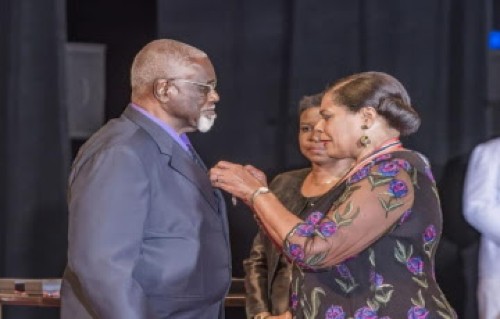PORT OF SPAIN, Trinidad –President Paula-Mae Weekes has led the tributes following the death of the Guyanese-born Professor Emeritus, Gordon Rohlehr, acknowledged as an authority on West Indian literature and the calypso, who died over the last weekend. He was 80 years old.
 President Paula Mae Weeks pinning the Chaconia Medal, Silver on Professor Emeritus, Gordon Rohlehr last yearRohlehr, who taught at the University of the West Indies St. Augustine Campus, was described in the statement by the head of state as “another member of the Distinguished Society of Trinidad and Tobago”.
President Paula Mae Weeks pinning the Chaconia Medal, Silver on Professor Emeritus, Gordon Rohlehr last yearRohlehr, who taught at the University of the West Indies St. Augustine Campus, was described in the statement by the head of state as “another member of the Distinguished Society of Trinidad and Tobago”.
The cause of death has not yet been released. Rohlehr was awarded the Chaconia Medal, Silver the Spheres of Literature, Culture, History and Education at the National Awards 2022 by the Trinidad and Tobago government.
The citation noted that he had “designed, piloted and taught the first course in West Indian Literature. He later became active in the expansion and development of the course offerings in English and was central to the introduction and teaching of American Literature and Post-Colonial Literature.
“His conviction was that literature had a fundamental role to play in developing adequate self-awareness without prejudice to the requirements of the wider world. His publications demonstrate insight, critical awareness and consciousness of the integration of the many social, historical, linguistic and political currents undergirding Caribbean reality.
“His most significant contribution to raise national consciousness has been his phenomenal work on calypso. He has traced calypso’s historical development and social relevance and has explored issues such as masculinity and gender long before these terms gained currency,” it added.
Rohlehr, who is the author of several books on different aspects of Caribbean culture, had said once that that his interest on researching and writing about calypso music dates back to his attendance of the Caribbean Artists Movement’s second meeting, held in 1967 at the North London flat of Orlando Patterson, when in response to discussion among the likes of Kamau Brathwaite, George Lamming and Aubrey Williams about “the Caribbean aesthetic”
“The way to determine what this aesthetic might be is to look at what Caribbean people have done and to create, through a close dialogue with the material, some way of talking about their achievement and of distinguishing what is peculiarly Caribbean about it, if you employ that method, beginning with the work–Walcott’s poetry, Sparrow’s calypsos, Selvon’s novels–you might then be able to recognize recurring features.
“If for example, you read Selvon’s The Lonely Londoners and short stories alongside Sparrow’s calypsos you might discover something that was peculiarly Trinidadian in both of these people…..those were not my exact words, of course; only a paraphrase of the sense of what I said. Then someone, one of the big voices, said, ‘If this is the way you feel, why don’t you do it?’, he is quoted as saying.
Former Professor in International Relations at UWI, Mark Kirton reflected on the passing of Rohlehr, told the Guyana-based on line publication, Demerarawaves.com that he “was an authority on West Indian literature and the calypso.
“He was a true academic and professional, always willing to offer advice and guidance to young scholars and students,” Kirton added.
Rohlehr graduated in 1964 from the University College of the West Indies, Jamaica, with a First Class Honours degree in English Literature, after which he wrote a doctoral dissertation titled Alienation and Commitment in the Works of Joseph Conrad at Birmingham University, England (1964-1967)


